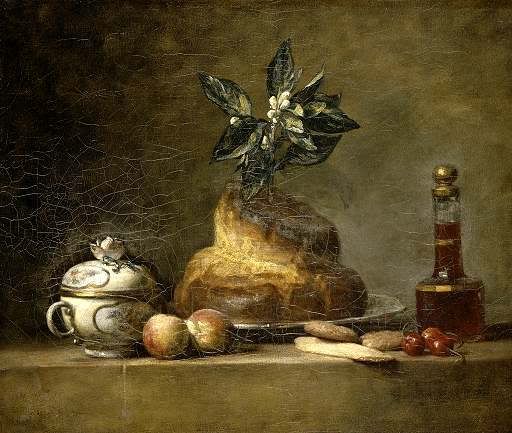
They trudged past acres of canvas, through one room after another, for Lydia had some difficulty in finding her way; but finally she stopped him in front of a small picture that you might easily have missed if you had not been looking for it.
"Chardin," he said. "Yes, I've seen that before."
"But have you ever looked at it?"
"Oh, yes. Chardin wasn't half a bad painter in his way. My mother thinks a lot of him. I've always rather liked his still lifes myself."
"Is that all it means to you? It breaks my heart."
"That?" cried Charley with astonishment. "A loaf of bread and a flagon of wine? Of course it's very well painted."
"Yes, you're right; it's very well painted; it's painted with pity and love. It's not only a loaf of bread and a flagon of wine; it's the bread of life and the blood of Christ, but not held back from those who starve and thirst for them and doled out by priests on stated occasion; it's the daily fare of suffering men and women. It's so humble, so natural, so friendly; it's the bread and wine of the poor who ask no more than that they should be left in peace, allowed to work and eat their simple food in freedom. It's the cry of the despised and rejected. It tells you that whatever their sins men at heart are good. That loaf of bread and that flagon of wine are symbols of the joys and sorrows of the meek and lowly. They ask for your mercy and your affection; they tell you that they're of the same flesh and blood as you. They tell you that life is short and hard and the grave is cold and lonely. It's not only a loaf of bread and a flagon of wine; it's the mystery of man's lot on earth, his craving for a little friendship and a little love, the humility of his resignation when he sees that even they must be denied him."
Lydia's voice was tremulous and now the tears flowed from her eyes. She brushed them away impatiently.
"And isn't it wonderful that with those simple objects, with his painter's exquisite sensibility, moved by the charity in his heart, that funny, dear old man should have made something so beautiful that it breaks you? It was as though, unconsciously perhaps, hardly knowing what he was doing, he wanted to show you that if you only have enough love, if you only have enough sympathy, out of pain and distress and unkindness, out of all the evil of the world, you can create beauty."
--W. Somerset Maugham, Christmas Holiday
~~~
And from Natalie Angier on the evolution of art:
"Perhaps the most radical element of Ms. Dissanayake’s evolutionary framework is her idea about how art got its start. She suggests that many of the basic phonemes of art, the stylistic conventions and tonal patterns, the mental clay, staples and pauses with which even the loftiest creative works are constructed, can be traced back to the most primal of collusions — the intimate interplay between mother and child. "


I would hate to sound like a total snob, but "la" brioche is feminine... Didn't stop me from enjoying the quote!
ReplyDeleteThanks for pointing out the error. A lens fell out of my reading glasses yesterday morning and I didn't squint hard enough to distinguish between the a and the e on the back cover of the book. :)
ReplyDeleteI'll correct it. . .
And actually, the back of the book calls the painting "Le Bricohe," so someone at Vintage doesn't know any more French than I do!
ReplyDelete